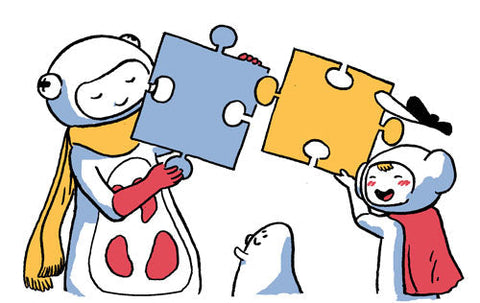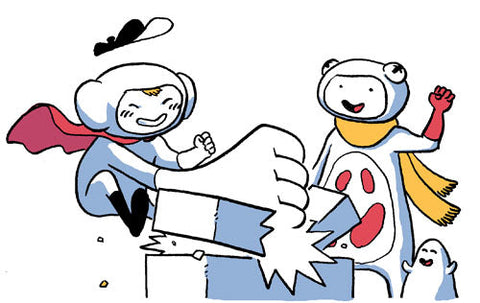Managers and leaders - most of us will have worked with a few of both in our times. The good ones can make even the most mundane role feel like an important vocation; bad ones can turn your dream job into a grind. So, what are the differences between a leader and a manager, and when are they important?
Pip Decks community members share their experiences with leaders and managers they have known. Combined, they have decades of experience. Here are some of the positive attributes they think you can use to spot the difference between a leader and a manager.
Skills that identify great leaders
Selling the vision with positivity
Charles Burdett (Founder of Pip Decks) notes that good leaders have skin in the game when it comes to the mission - it matters to them personally whether or not it is successful.
Adrian explains how leaders inspire people to share their vision using positive communication, and by avoiding any negativity. This is a key principle in content management - our brains are hardwired to avoid negativity, if possible, so positive phrasing tends to keep people interested in your story for longer. That’s crucial for leadership messaging!
Knowing when to lead - and when to follow
The best leaders will also have their own leaders to follow. They don’t need to be in charge all of the time, and will be able to identify the situations where they need to follow someone else’s leadership.
That could be on a macro level - in light of global trends and events - or on a micro level, where they follow the guidance of an expert they have appointed, even if they are further down the hierarchy. In turn, that gives those people the opportunity to practise their own leadership skills.
Skills that identify great managers
Getting to know the team personally
Ann shared a story about a manager that immediately noticed and diffused some professional tension that was threatening to turn into something more. The manager got to know her personally, and realised that she was experiencing a difficult situation. In doing so, he kept the team running despite the challenges that could have derailed them. He also helped her engineer a graceful exit from that project, while leaving the door open to future work. Win-win! Interestingly, Ann mentioned that stronger leadership (not from the manager) could have resolved the situation before the issue escalated to the point it did.
So is a manager’s role also to handle the impact of leadership decisions, whether those are positive or negative?
John agrees that effective relationship building, alongside communication, was a key feature of the best managers he’s known.
“Were they supportive? Were they reliable? Could I be open with them? Do we speak the same language, or could we develop a shared language/approach over time? The good ones, yes to all of the above.”
Creating a team that is more than the sum of its parts
Similarly, John mentioned that good managers helped him find opportunities to learn, solutions to challenges and a way to navigate organisational politics, too.
Skills that came up in this respect include empathy and relationship building. Emotional intelligence also helps managers create a safe environment in which team members can share their challenges, in order to overcome them together.
A great leader, however, may be leading an organisation of thousands, all around the world, or even be leading a non-defined group (i.e., not a business; perhaps a country or movement). They don’t need to get to know everyone individually.
What are the similarities between leaders and managers?
Interestingly - since they are both positions of authority - one attribute that both require is that they don’t need to be in control, and can go with the flow. Tom Kerwin shared that good leaders and managers both start from where people are, not where they would like them to be. These two attributes point to objectivity as a core strength of both roles.
Another point that came up was the ability to understand and encourage different approaches to work. For leaders, this looks like a heavy focus on outcomes rather than the specifics of how they are achieved. For managers, though, this is the way that they get the best out of the people they are responsible for. That could mean trying different systems or allowing a flexible approach to work - both of which should not be leadership decisions.
Why is it so important for managers to have different skills to leaders?
Leaders, as the name suggests, are out in front. They make the big decisions and need to have the skills to do so without getting bogged down in the details. They also need to inspire confidence in those decisions. They focus on outcomes, not how people achieve them.
Managers, on the other hand, tend to support from behind. They are the coach, pastoral care and the person who leads on discussions about promotions and salaries. They need to inspire confidence in their integrity and availability to team members. They focus on achievements, but don’t have their own skin in the game when it comes to the outcomes themselves - just that they are reached, if possible!
These two roles need to be separate from each other to allow for healthy team dynamics. Can you robustly challenge someone if they are guiding your career path? Should you seek candid advice about a conflict from someone who leads potentially thousands of other people? The answer to both is - probably not.
So, what is the main difference between leaders and managers?
There are many different types of leader and manager, although the latter is often more clearly defined. But whether we are talking about projects, businesses or campaigns - there is a common theme on what the difference is.
As one Pip Decks member puts it:
“Leaders are catalysts that make change happen (but they do not direct that change!).”
The final word on this goes to Natasha S den Decker, who succinctly says:
We couldn't have put it better ourselves.“A leader is all about the vision and the strategy, and a manager is there to execute those things and communicate them to the relevant teams.”
Take things to the next level with the Pip Decks community
When you buy any deck from Pip Decks - like Workshop Tactics or Storyteller Tactics - you get access to the lovely community of super helpful professionals that shared their experiences in this article.
And of course, you’ll get into the Vault, which contains (among other things) videos of expert-led community events, and Miro templates for all of the cards.









